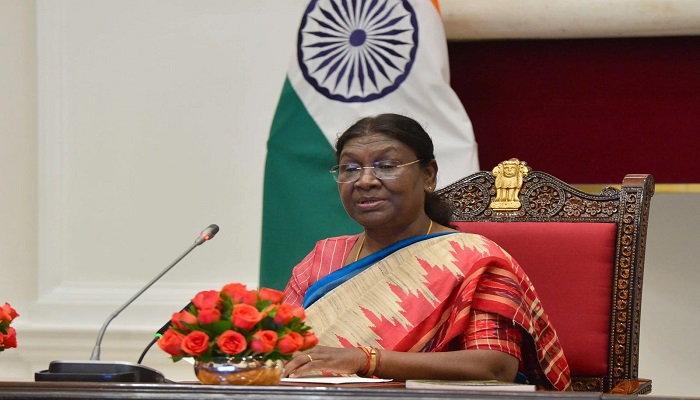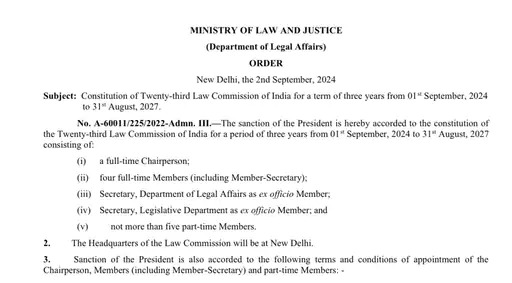
President Draupadi Murmu constituted the 23rd Law Commission of India for a term of three years. Its term will be from 1 September 2024 to 31 August 2027. The government has issued a notification, in which serving judges of the Supreme Court and High Court will be its chairman and members. The term of the 22nd Law Panel ended on 31 August. According to the orders of the Law Commission issued through a gazette notification late on Monday 02 September, the panel will have a full-time chairman and 4 full-time members including a member-secretary.

Constitution of the 23rd Law Commission
The Secretary of the Department of Legal Affairs and the Secretary of the Legislative Department will be its ex-officio members. As per the rules, there cannot be more than five part-time members. The order states that- “The Chairperson/Members who are serving judges of the Supreme Court/High Court will continue to perform their duties on a full-time basis till the date of their retirement from the Supreme Court/High Court or the expiry of the tenure of the Commission.
The order also said that if persons belonging to the “other category” are appointed as chairperson or full-time members, the chairperson will be entitled to a salary of Rs 2.50 lakh (fixed) per month. Members will be paid a salary of Rs 2.25 lakh per month.
The Government of India constituted the 22nd Commission on 21 February 2020 for a term of 3 years. Justice Awasthi assumed charge as the chairman on 9 November 2022. The Union Cabinet extended the term of the 22nd Law Commission in February 2023. The first Law Commission after independence in the country was constituted in the year 1955. So far 22 commissions have completed their tenure since independence. Their job is to advise the government on complex legal issues.
The 22nd Law Commission has given its suggestions to the government on several matters. This includes various laws and issues like One Nation-One Election, POCSO Act and online FIR and Uniform Civil Code (UCC). The Commission's report on UCC is still incomplete. The One Nation, One Election report is ready but awaits submission to the Law Ministry.
There are two types of laws in any country. The first is criminal law and the second is civil law. Let us tell you that criminal cases like theft, robbery, assault, murder are kept and heard in criminal law. It orders the same type of court, procedure and punishment for all religions or communities.
All matters related to marriage and property come under civil law. Different religions in India have different customs, cultures and traditions in matters related to marriage, family and property. That is why such laws are also called personal laws. There has been a long standing demand for abolishing personal law and making a uniform law for all through a uniform civil code.
 look news india
look news india